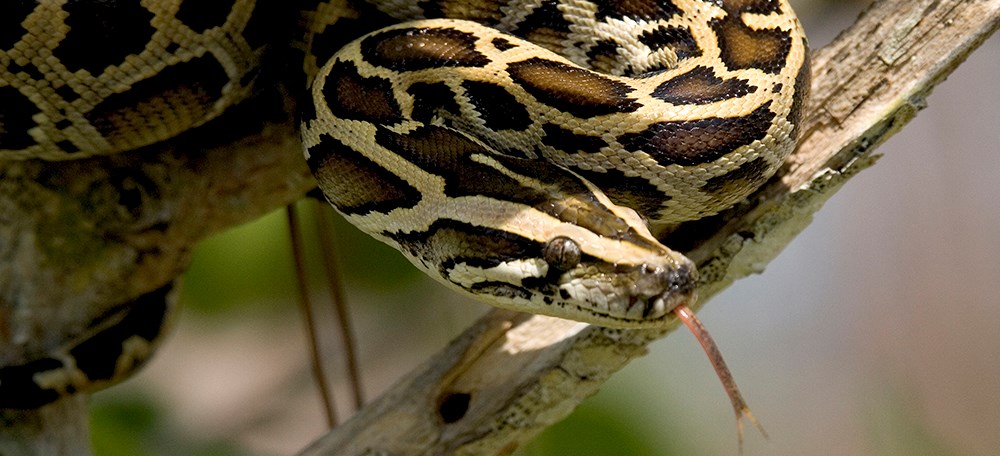Journal Entry 3
The further I dive into the literature of The Everglades, the more invaders I find! While this newly found foe of the natives is green in color, it is far hungrier than the plants I explored previously: Python bivittatus, or more commonly known as the Burmese Python.

(Image taken from: The National Park Service Burmese Python page)
>
These snakes are believed to have been introduced into The Everglades by pet owners. Once these slithering creatures grow to their full size, they become much more difficult – and potentially dangerous – to care for. Careless pet owners have then taken it upon themselves to dump their snakes into The Everglades. If only they had known the havoc they would wreak upon the river of grass. These snakes have been believed to be the cause of a drastic decline in mammals in The Everglades. Marsh rabbits, cottontail rabbits, and foxes have practically been eradicated by these scaly invaders. Even further, raccoons, opossums, and even bobcats have also seen drastic drops in population for over 20 years.
In response to the rising number of these slithering invaders, the National Park Service has partnered with many other organizations in order to get the population of pythons under control. These include Florida Fish and Wildlife Commission (FWC) to create a statewide management plan for these pythons, United States Geological Survey in creating a summary of all research on pythons in The Glades for conciseness and overall understanding, and again with FWC to contract authorized python removal agents.
In tandem with responding to this invasive snake, FWC has also initiated an Exotic Pet Amnesty Program. During scheduled events, pet owners may surrender exotic pets for any reason. This way, FWC is able to facilitate what happens next to the pet and helps with the readoption process. This information is a great reminder of the great responsibility that comes with owning ANY pet, whether it be invasive, native, or domesticated.
I have also found numerous efforts encouraging families and others to be smart when selecting pets to bring home. The National Park Service provides many resources for pet owners and teachers alike to educate as many as possible about the responsibilities and potential consequences of owning an exotic pet. In the state of Florida in particular, FWC has listed a step-by-step process in reporting nonnative species should you see them on your property or elsewhere.
>
>
>
References
https://www.usgs.gov/faqs/how-have-invasive-pythons-impacted-florida-ecosystems
https://www.nps.gov/ever/learn/nature/burmesepythonresearch.htm
https://www.nps.gov/ever/learn/nature/burmhowtohelp.htm https://myfwc.com/wildlifehabitats/nonnatives/amnesty-program/
